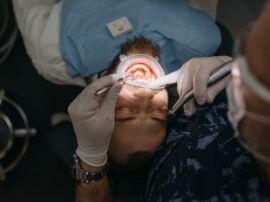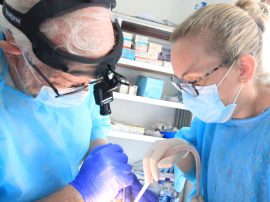When Is Wisdom Teeth Removal Necessary?
Wisdom teeth, the third set of molars that usually appear in late teens or early twenties, can sometimes cause problems. Many experience issues with impacted wisdom teeth, meaning they don’t have enough room to emerge properly. These problems can lead to discomfort, pain, and even dental complications to adjacent teeth.
In this article, we’ll explore when wisdom teeth removal may be necessary. We’ll discuss common issues associated with wisdom teeth, signs that removal might be needed, and the importance of seeking professional advice.
Understanding when to consider wisdom teeth removal can help maintain good oral health and prevent potential complications. Let’s get started.
What are Wisdom Teeth?
Wisdom teeth are the third set of molars, located at the back of the mouth, behind the second molars. They usually emerge between the ages of 17 and 25, a time often referred to as the “age of wisdom,” hence the name. However, not everyone develops wisdom teeth, and for some lucky individuals, they may never appear at all.
For those who do have wisdom teeth, they can be found in the upper and lower jaws, typically four in total, with one in each corner. These teeth are remnants from our evolutionary past when our ancestors had larger jaws and needed extra molars for grinding tough foods.
While wisdom teeth can serve a purpose, they can sometimes cause problems. Impaction, overcrowding, and infection are common issues associated with wisdom teeth. However, for some people, wisdom teeth can emerge without causing any trouble at all.
Common Problems Associated with Wisdom Teeth
The wisdom tooth, while essential for our ancestors, can bring about various issues in modern times. From impaction to infection, these molars can cause discomfort and dental complications for many individuals.
Impaction
When wisdom teeth lack adequate space to emerge properly, they may become impacted, meaning they remain trapped beneath the gums or only partially emerge. Impacted wisdom teeth can lead to pain, swelling, and potential damage to surrounding teeth and bone structure.
Crowding
As wisdom teeth emerge, they can exert pressure on neighboring teeth, causing them to shift or become misaligned. This crowding effect can disrupt the alignment of the entire dental arch, leading to bite problems and potential orthodontic issues.
Infection
The positioning of wisdom teeth, particularly if partially erupted, can create pockets where food particles and bacteria become trapped.
This environment is conducive to bacterial growth, leading to inflammation of the surrounding gums (known as pericoronitis) and potential infection. Symptoms may include swelling, pain, and difficulty opening the mouth fully.
Decay
Wisdom teeth, located at the back of the mouth, can be challenging to clean properly, especially if they are impacted or poorly positioned.
This difficulty in maintaining proper oral hygiene can increase the risk of tooth decay and cavities. Decay in wisdom teeth may require fillings or, in severe cases, extraction to prevent further damage to neighboring teeth and gums.
Signs Wisdom Teeth Removal May Be Necessary
Experiencing pain or discomfort in the back of the mouth can be a clear indication that something isn’t right with your wisdom teeth. This discomfort may be persistent or occur intermittently, often worsening when chewing or applying pressure to the affected area.
Swelling or redness around the gum line, particularly in the vicinity of the wisdom teeth, can signal inflammation or infection. This swelling may be accompanied by tenderness to touch and may worsen over time if left untreated.
Difficulty opening the mouth fully, known as trismus, can occur when impacted wisdom teeth exert pressure on the surrounding tissues and muscles. Trismus can range from mild to severe and may be accompanied by discomfort or pain when attempting to open the mouth wider than usual.
Jaw stiffness is another common symptom associated with problematic wisdom teeth. This stiffness may manifest as a sensation of tightness or limited mobility in the jaw joint, making it uncomfortable to chew or speak.
Persistent bad breath or an unpleasant taste in the mouth may also indicate the presence of bacteria or food particles trapped around the wisdom teeth. This can lead to the development of oral infections or inflammation, resulting in chronic halitosis or a foul taste that doesn’t go away with regular oral hygiene practices.
The Wisdom Teeth Removal Process
The wisdom teeth removal process typically begins with an initial consultation and examination at Denticine, the leading oral maxillofacial surgery practice in Brisbane, Queensland.
During this appointment, patients will meet with our experienced oral surgeon who will evaluate the position and condition of their wisdom teeth using advanced imaging technology and a thorough physical examination. They will discuss treatment options and address concerns.
Before the surgical procedure at Denticine, patients receive clear preoperative instructions, including fasting and medication guidance. The procedure itself may involve local or general anaesthesia. Our skilled professionals perform the removal using advanced equipment, prioritising patient comfort and safety.
Following surgery, patients receive postoperative care instructions tailored to their needs. This includes pain management and dietary recommendations. Patients can trust us for ongoing support, ensuring optimal outcomes and a speedy recovery.
Recovery After Wisdom Teeth Removal
After wisdom teeth removal at Denticine, the recovery process typically involves some discomfort and swelling. Patients may need to rest for a few days and avoid strenuous activities. Pain medications can help manage any discomfort.
It’s essential to follow postoperative care instructions carefully, including sticking to a soft diet and avoiding straws. Applying ice packs to the cheeks can help reduce swelling. Patients should also attend follow-up appointments as scheduled.
With proper care and rest, most patients can expect to feel better within a week and resume normal activities gradually.
Your Guide to Wisdom Teeth Extraction
To sum up, understanding the potential issues associated with wisdom teeth is crucial for maintaining oral health. From impaction to infection, these molars can cause discomfort and complications.
It’s essential to consult with a dental professional, such as those at Denticine, if experiencing any problems with wisdom teeth. Early intervention can prevent further issues and ensure optimal oral health. Click here to schedule an appointment with us.





